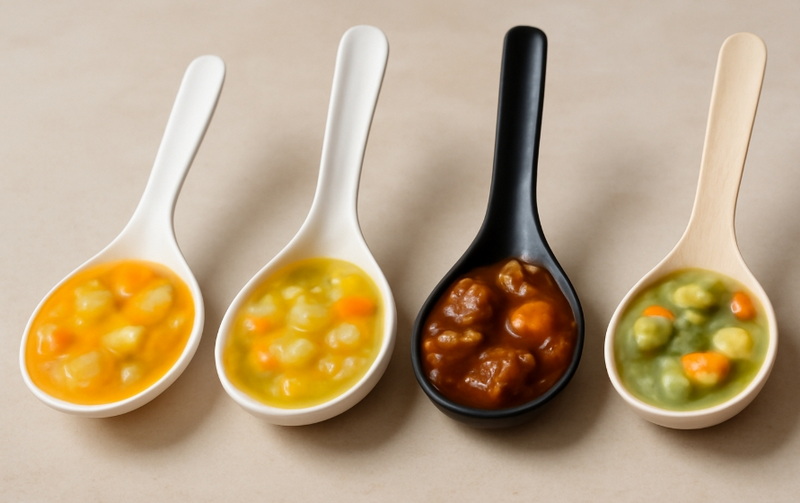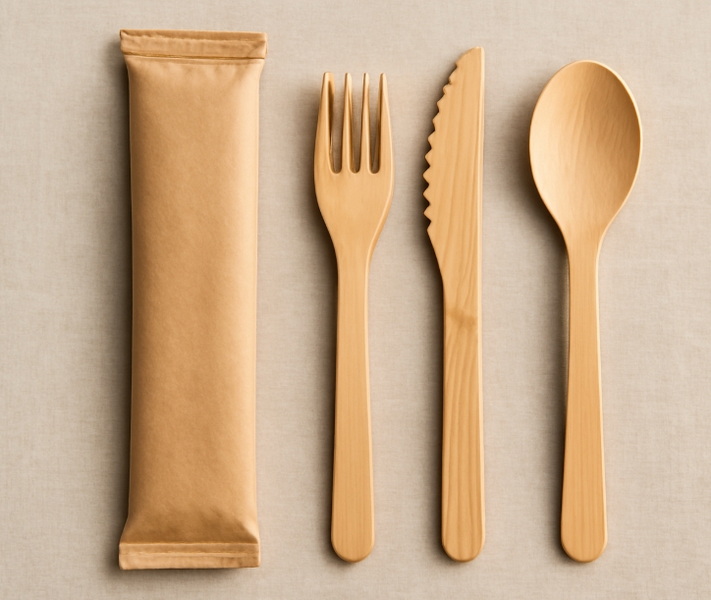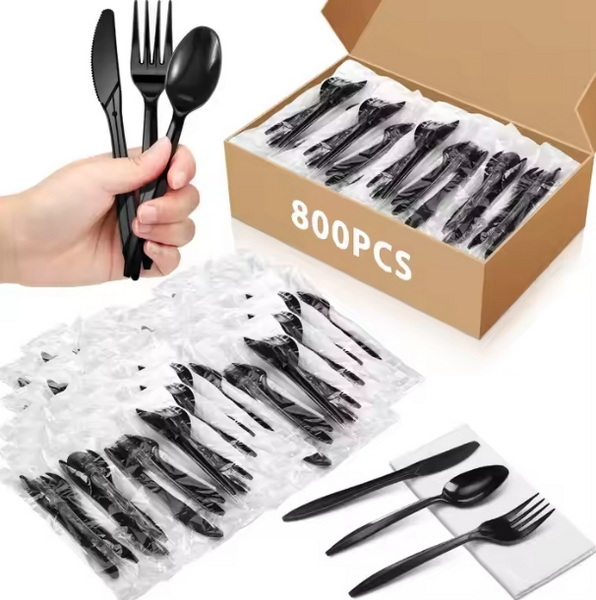
Content Menu
● Understanding Disposable Soup Spoons
>> What Are Disposable Soup Spoons?
>> Types of Disposable Soup Spoons
● The Demands of Thick Soups and Stews
● Can Disposable Spoons Handle Thick Soups and Stews?
>> Strength and Durability
>> Heat Resistance
>> Ergonomics and Comfort
>> Versatility
● Choosing the Right Disposable Soup Spoon
>> Factors to Consider
>> Popular Applications
● Advantages of Using Disposable Soup Spoons for Thick Soups and Stews
● Limitations and Considerations
● Best Practices for Using Disposable Soup Spoons
● Comparing Disposable Soup Spoons: What to Look For
● Real-World Scenarios: When Disposable Soup Spoons Shine
● Environmental Impact and Sustainable Choices
● Conclusion
● FAQ
>> 1. What makes a disposable soup spoon suitable for thick soups and stews?
>> 2. Are all disposable soup spoons heat-resistant?
>> 3. Can I use compostable soup spoon disposable options for thick soups?
>> 4. Are disposable soup spoons hygienic for public events?
>> 5. How can I dispose of soup spoon disposable utensils responsibly?
Enjoying a hearty bowl of thick soup or a robust stew is one of life's simple pleasures-whether at home, a picnic, or a catered event. Yet, one practical question often arises: are disposable soup spoons up to the task, or will they bend, snap, or otherwise disappoint when faced with chunky chowders, creamy bisques, or meaty stews? This comprehensive guide explores the suitability of soup spoon disposable options for thick soups and stews, detailing their types, strengths, ideal uses, and best practices for an enjoyable and mess-free dining experience.

Understanding Disposable Soup Spoons
What Are Disposable Soup Spoons?
Disposable soup spoons are single-use utensils typically made from plastic, designed for convenience and hygiene. Unlike traditional metal or ceramic spoons, these are meant to be used once and discarded, making them popular at large gatherings, takeout services, and outdoor events. They come in various shapes, sizes, and materials, each offering distinct benefits.
Types of Disposable Soup Spoons
- Heavyweight Plastic Spoons: Crafted for durability, these spoons are thicker and sturdier, often made from polypropylene or polystyrene. They are intended to handle dense soups and stews without bending or snapping.
- Medium Weight Spoons: Slightly lighter, these are suitable for broths and lighter soups but may not perform as well with chunky or thick dishes.
- Asian-Style Disposable Soup Spoons: Designed with a deeper bowl and often a flat bottom, these are ideal for scooping both broth and solid ingredients, making them versatile for a range of cuisines.
- Compostable/Biodegradable Spoons: Made from plant-based materials, these offer an eco-friendly alternative while still providing reasonable strength for most soups.
The Demands of Thick Soups and Stews
Thick soups and stews present unique challenges for utensils. Their dense consistency, large chunks of meat or vegetables, and sometimes sticky or creamy bases require a spoon that is both strong and comfortable to use. A standard lightweight plastic spoon may buckle under the pressure, leading to spills or even breakage. Therefore, the right soup spoon disposable option is crucial for a pleasant dining experience.
Can Disposable Spoons Handle Thick Soups and Stews?
Strength and Durability
Modern soup spoon disposable options, especially those labeled as “heavyweight” or “extra heavy weight,” are specifically engineered to withstand the rigors of thick soups and stews. These spoons are made from robust plastics like polypropylene or polystyrene, materials chosen for their rigidity and resistance to bending or snapping under pressure. Many are tested to ensure they can handle hearty dishes such as chili, gumbo, and chowder without issue.
Heat Resistance
Another key factor is heat resistance. Thick soups and stews are often served piping hot, and a quality disposable soup spoon must not melt, warp, or leach chemicals when exposed to high temperatures. Heavyweight plastic spoons are designed to maintain their shape and integrity, ensuring safety and comfort while eating.
Ergonomics and Comfort
A well-designed disposable soup spoon will feature a rounded bowl and a sturdy handle, providing a comfortable grip and making it easier to scoop up both liquid and solid ingredients. Some models include a raised back edge or a flat bottom, further enhancing usability and preventing spills.
Versatility
Disposable soup spoons are not limited to soups alone. Their strength and design make them suitable for stews, chili, curries, and even desserts like pudding or ice cream. This versatility makes them an excellent choice for events where a variety of dishes are served.
Choosing the Right Disposable Soup Spoon
Factors to Consider
- Weight and Material: Always opt for heavyweight or extra heavy weight spoons for thick soups and stews. Polypropylene and polystyrene are preferred for their strength.
- Bowl Depth: A deeper bowl allows for easier scooping of both broth and chunky ingredients.
- Handle Design: Look for spoons with reinforced or ergonomically designed handles for better grip and control.
- Heat Resistance: Ensure the spoon is rated for use with hot foods.
- Eco-Friendliness: If sustainability is a concern, consider compostable options, but check that they are rated for hot and thick foods.
Popular Applications
- Catering and Events: Disposable soup spoons are ideal for large gatherings, buffets, and catered events where washing and reusing utensils is impractical.
- Takeout and Delivery: Restaurants and food trucks favor disposable soup spoons for convenience and hygiene, especially when serving thick, hearty dishes.
- Outdoor Activities: Picnics, barbecues, and camping trips benefit from the lightweight and portable nature of disposable soup spoons.

Advantages of Using Disposable Soup Spoons for Thick Soups and Stews
- Convenience: No need to wash up after meals; simply dispose of the spoon after use.
- Hygiene: Single-use design reduces the risk of cross-contamination, making them ideal for public events and takeout.
- Strength: Heavyweight options are specifically designed to handle thick, chunky foods without bending or breaking.
- Cost-Effectiveness: Bulk purchases are economical, especially for large events or businesses.
- Versatility: Suitable for a wide range of dishes beyond soup, including stews, chili, and desserts.
- Aesthetic Variety: Available in various colors and styles, including elegant black or white options for upscale events.
Limitations and Considerations
While disposable soup spoons offer many benefits, there are some limitations to consider:
- Environmental Impact: Traditional plastic spoons contribute to landfill waste. Eco-friendly alternatives are available but may be more expensive.
- Perceived Quality: Some diners may prefer the feel of metal or ceramic spoons, especially for formal occasions.
- Performance of Lightweight Spoons: Not all disposable spoons are created equal. Lightweight or flimsy spoons may struggle with thick soups and stews, leading to frustration.
Best Practices for Using Disposable Soup Spoons
- Choose the Right Weight: Always select heavyweight or extra heavy weight soup spoon disposable options for thick or chunky dishes.
- Test Before Large Events: If catering, test the spoons with your thickest soup or stew to ensure they perform as expected.
- Provide Ample Supply: For large gatherings, have extra spoons on hand in case of accidental breakage or high guest turnout.
- Consider Presentation: For upscale events, choose spoons with elegant designs or colors to match your décor.
- Promote Responsible Disposal: Encourage guests to recycle or compost spoons where facilities exist, especially if using eco-friendly options.
Comparing Disposable Soup Spoons: What to Look For
| Feature | Heavyweight Plastic | Medium Weight Plastic | Compostable/Biodegradable |
| Strength | Excellent | Moderate | Good |
| Heat Resistance | High | Moderate | Varies |
| Usability with Thick Soups | Excellent | Fair | Good |
| Eco-Friendliness | Low | Low | High |
| Cost | Moderate | Low | Higher |
| Aesthetic Options | Many | Some | Few |
Real-World Scenarios: When Disposable Soup Spoons Shine
- Office Lunches: Employees can enjoy homemade or restaurant-bought stews without worrying about washing up.
- Food Festivals: Vendors serve thick chowders or chili efficiently, with no need for on-site dishwashing.
- School Cafeterias: Students can safely and easily eat thick soups, with minimal mess and maximum hygiene.
- Outdoor Catering: Events in parks or gardens benefit from the portability and disposability of soup spoon disposable utensils.
Environmental Impact and Sustainable Choices
With growing awareness of environmental issues, many consumers and businesses are seeking greener alternatives. Compostable and biodegradable soup spoon disposable options are increasingly available. These spoons are made from materials like cornstarch or bamboo and are designed to break down in commercial composting facilities. While they may cost more, they significantly reduce landfill waste and align with eco-conscious values.
Conclusion
Disposable soup spoons, especially those designed as heavyweight or extra heavy weight, are not only suitable but highly effective for thick soups and stews. Their strength, heat resistance, and ergonomic designs ensure a pleasant dining experience, whether at a formal event, a casual picnic, or a busy restaurant. While environmental considerations remain important, the availability of compostable options means you can enjoy the convenience of soup spoon disposable utensils without sacrificing your commitment to sustainability.
In summary: Choose heavyweight soup spoon disposable options for thick soups and stews, prioritize heat resistance and ergonomic design, and consider eco-friendly alternatives where possible. With the right selection, disposable soup spoons can elevate your dining experience, offering both practicality and peace of mind.

FAQ
1. What makes a disposable soup spoon suitable for thick soups and stews?
A disposable soup spoon is suitable for thick soups and stews when it is made from heavyweight plastic or other durable materials. These spoons resist bending and breaking, even when used with chunky or dense foods. Look for options labeled as “heavyweight” or “extra heavy weight” for best results.
2. Are all disposable soup spoons heat-resistant?
Not all disposable soup spoons are equally heat-resistant. Heavyweight plastic spoons are typically designed to withstand high temperatures without melting or warping. Always check the product specifications to ensure the spoon is safe for hot foods.
3. Can I use compostable soup spoon disposable options for thick soups?
Yes, many compostable soup spoon disposable options are strong enough for thick soups and stews. However, it's important to verify that the specific product is rated for use with hot and dense foods, as some biodegradable materials may soften or lose strength when exposed to heat.
4. Are disposable soup spoons hygienic for public events?
Disposable soup spoons are highly hygienic for public events because they are single-use, reducing the risk of cross-contamination. Individually wrapped options offer an added layer of cleanliness, making them ideal for catering, takeout, and large gatherings.
5. How can I dispose of soup spoon disposable utensils responsibly?
To dispose of soup spoon disposable utensils responsibly, look for recycling or composting facilities that accept the material your spoon is made from. Compostable spoons should be placed in commercial compost bins, while recyclable plastics can go into appropriate recycling streams. Avoid littering and encourage guests to use designated disposal bins.

















